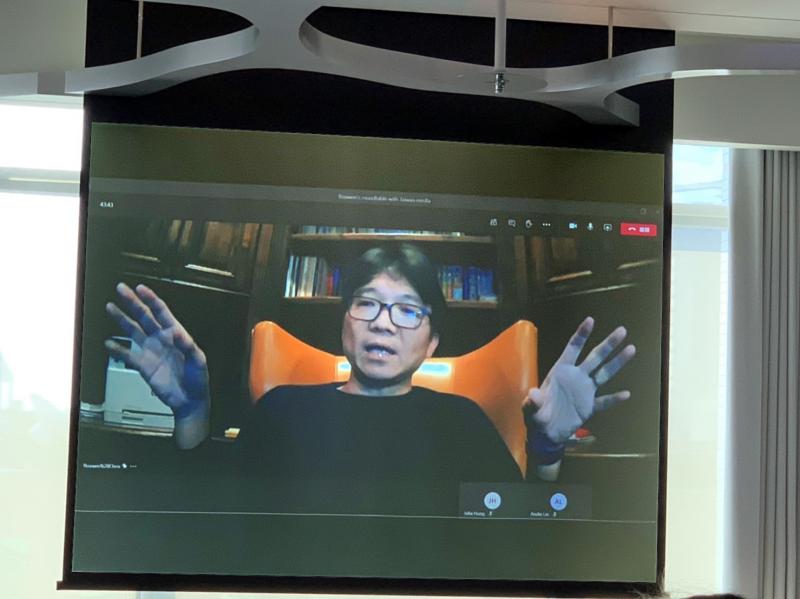Taiwan is to benefit from growing adoption of millimeter-wave (mmWave) technology, open platform base stations and new breeds of notebook computers powered by Arm Ltd chips, given its comprehensive semiconductor supply chains, a Qualcomm Inc executive said yesterday.
With high bandwidth of 28-gigahertz, mmWave technology is bringing gigabit-speed and low latency similar with fiber networks, enabling new applications that 4G technology cannot support, Qualcomm senior vice president of manufacturing technology and operations Roawen Chen (陳若文) said at a virtual meeting.
More than half of mmWave production value would come from non-smartphone areas that include smart manufacturing and autonomous systems, Chen said.

Photo: Vanessa Cho, Taipei Times
Qualcomm expects mmWave technology to help drive US$13.2 trillion in production value in 2035, with about US$4.77 trillion coming from the smart manufacturing segment.
Smartphones are to generate much lower production value at US$2.22 trillion, the company said.
Devices supporting mmWave technology consume much more silicon content, or chips, than those for sub-6-gigahertz technology and 4G LTE technology, Chen said.
“As Taiwan has the world’s most comprehensive [semiconductor] ecosystem, the mmWave technology will be a boon to the country,” he said.
Using base stations based on open radio access network (O-RAN), or virtualized radio access network (vRAN), opens the door for Taiwan’s networking equipment manufacturers to make inroads into the telecom sector by supplying small cell base stations, he said.
Such stations are the most important building block for O-RAN networks, Chen said.
The telecom segment is a much “bigger and sweeter pie” than the data communications segment, which local networking equipment makers now supply Wi-Fi products, he added.
An O-RAN-based or vRAN-based base station works on an open platform, making it easier for new telecoms to build 5G networks fast and cost-effectively.
Such stations are different from traditional and closed-loop base stations designed by existing suppliers, Nokia Oyj, Ericsson AB and Huawei Technologies Inc (華為), Chen said.
Geopolitical tensions between the US and China are providing an opportunity for Taiwanese companies to build their presence in the telecom market, as most countries are trying to avoid Chinese-made base stations due to national security concerns, he said.
Equipment maker Sercomm Corp (中磊) said it has been developing small cell base stations for more than a decade, but its stations had not been adopted until this year — by Chunghwa Telecom Co (中華電信), which is building a 5G mmWave private enterprise network for ASE Technology Holding Co (ASE, 日月光投控).
Telecoms have shown a stronger interest over the past six months in deploying O-RAN-based base stations due to their lower costs, Chen said.
Japan’s Rakuten Mobile Inc was the first telecom to build its 5G network using virtualized techniques, he said.
Apple Inc’s announcement that it would use its own ARM-based M1 chip instead of Intel Corp chips for its new notebook computer next year would create new opportunities for Taiwanese firms, as they no longer have to rely on Window’s Intel structure to build their computers, Chen said.
Taiwanese companies can design and make their chips for PCs and servers in Taiwan, a sign that most of the PC value chain is going to stay in Taiwan, he said.

CHIP WAR: Tariffs on Taiwanese chips would prompt companies to move their factories, but not necessarily to the US, unleashing a ‘global cross-sector tariff war’ US President Donald Trump would “shoot himself in the foot” if he follows through on his recent pledge to impose higher tariffs on Taiwanese and other foreign semiconductors entering the US, analysts said. Trump’s plans to raise tariffs on chips manufactured in Taiwan to as high as 100 percent would backfire, macroeconomist Henry Wu (吳嘉隆) said. He would “shoot himself in the foot,” Wu said on Saturday, as such economic measures would lead Taiwanese chip suppliers to pass on additional costs to their US clients and consumers, and ultimately cause another wave of inflation. Trump has claimed that Taiwan took up to

A start-up in Mexico is trying to help get a handle on one coastal city’s plastic waste problem by converting it into gasoline, diesel and other fuels. With less than 10 percent of the world’s plastics being recycled, Petgas’ idea is that rather than letting discarded plastic become waste, it can become productive again as fuel. Petgas developed a machine in the port city of Boca del Rio that uses pyrolysis, a thermodynamic process that heats plastics in the absence of oxygen, breaking it down to produce gasoline, diesel, kerosene, paraffin and coke. Petgas chief technology officer Carlos Parraguirre Diaz said that in

Japan intends to closely monitor the impact on its currency of US President Donald Trump’s new tariffs and is worried about the international fallout from the trade imposts, Japanese Minister of Finance Katsunobu Kato said. “We need to carefully see how the exchange rate and other factors will be affected and what form US monetary policy will take in the future,” Kato said yesterday in an interview with Fuji Television. Japan is very concerned about how the tariffs might impact the global economy, he added. Kato spoke as nations and firms brace for potential repercussions after Trump unleashed the first salvo of

SUPPORT: The government said it would help firms deal with supply disruptions, after Trump signed orders imposing tariffs of 25 percent on imports from Canada and Mexico The government pledged to help companies with operations in Mexico, such as iPhone assembler Hon Hai Precision Industry Co (鴻海精密), also known as Foxconn Technology Group (富士康科技集團), shift production lines and investment if needed to deal with higher US tariffs. The Ministry of Economic Affairs yesterday announced measures to help local firms cope with the US tariff increases on Canada, Mexico, China and other potential areas. The ministry said that it would establish an investment and trade service center in the US to help Taiwanese firms assess the investment environment in different US states, plan supply chain relocation strategies and